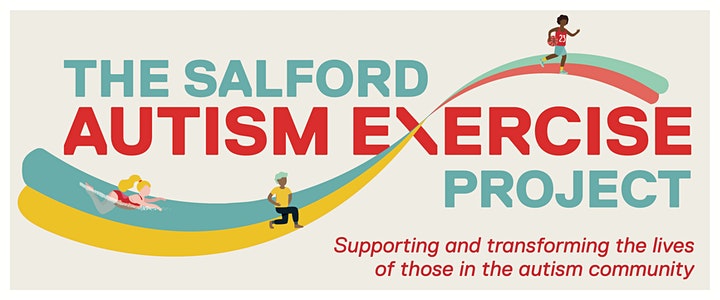Our next University of Salford ESRC Festival of Social Science event was organised and hosted by Eve Bent, Amy Bidgood and David Tate, who are all members of psychology staff at the University of Salford. Together, they run the Salford Autism Exercise Project (@AutismExercise).
The event took the form of short, online talks from Salford’s researchers on language and autism in general and also presented preliminary findings from the Salford Autism Exercise Project. Attendees were encouraged to ask questions after the presentations and share their experiences.
What is the Salford Autism Exercise Project about?
Autistic children often have problems with their sleep (getting to sleep, staying asleep, getting up too early, etc.) and this can have a big impact on them and their families. We know that exercise can help improve sleep in some children and we also know that sleep is important for making memories, including learning new words. The project tested whether swimming lessons can help autistic children to sleep better and whether improving sleep can also help the children learn words more easily.
The session highlighted some interesting facts about autism and the disparities in diagnosis between countries and also between different ethnic groups. Around 1% of people in the UK are given an autism diagnosis and interestingly, autism is reported to be 5 times more common in boys than in girls. The strain that autism can have on families was also discussed, given the extra support required, and often not received, for diagnosed children. This can cause a decline in parental mental health and wellbeing and the stresses of how to support their children in the longer term.
Salford’s researchers presented their own preliminary findings, using swimming as the form of intervention. The swimming lessons are run by The Seashell Trust, a specialist provider (see https://www.seashelltrust.org.uk/sleep-better/ for further details), and feedback to date has been overwhelmingly positive. The children involved have benefitted from making new friends, as have the parents. Smaller swimming lessons were more enjoyable for the children who wouldn’t be able to cope with bigger groups of children, for example. Sleep has been monitored using sleep diaries and questionnaires, and early findings have shown some improvement in sleep as a result of the exercise intervention. Word-learning has been tested through teaching children novel names for novel objects and testing memory, but results to date have been less positive, suggesting that children’s ability to learn new words was not influenced by the swimming intervention and improved sleep.
Recruitment for the study is still ongoing and there are plans to keep expanding this project in the future, with some of the participants at the event confirming that were interested in learning more about this type of intervention.
We look forward to welcoming you to other forthcoming Festival events:
| Event | Date | Time |
| COP26 Universities LIVE | 15th November | 5pm-6pm |
| We Love Peel Park: Graphic Novel Launch | 18th November | 6pm-7.30pm |
| Pirates and Exploding Man! A Hazard Signs Interactive Intervention | 23rd November | 10am-12pm |
| Cognitive Restoration: The Effects of the Environment on Thinking | 27th November | 10am-5pm |
| Social Capital: Understanding its Value in Strengthening Resilience | 29th November | 10am-12pm |
